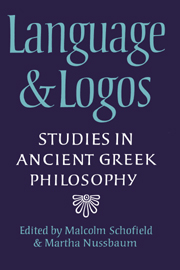Book contents
- Frontmatter
- Contents
- Preface
- Introduction
- 1 Heraclitus' conceptions of flux, fire and material persistence
- 2 Epistemology and meaning in Heraclitus
- 3 The dénouement of the Cratylus
- 4 Cratylus' theory of names and its refutation
- 5 Knowledge and language: the Theaetetus and the Cratylus
- 6 Falsehood and not-being in Plato's Sophist
- 7 Forms and dialectic in the second half of the Parmenides
- 8 Aristotle and the more accurate arguments
- 9 Aristotle on the principles of change in Physics I
- 10 Aristotle on natural teleology
- 11 Accidental unities
- 12 Aristotle's concept of signification
- 13 Saving Aristotle's appearances
- 14 Myths about non-propositional thought
- 15 Gods and heaps
- Bibliography of the publications of G. E. L. Owen
- Index locorum
- Index of names
10 - Aristotle on natural teleology
Published online by Cambridge University Press: 09 October 2009
- Frontmatter
- Contents
- Preface
- Introduction
- 1 Heraclitus' conceptions of flux, fire and material persistence
- 2 Epistemology and meaning in Heraclitus
- 3 The dénouement of the Cratylus
- 4 Cratylus' theory of names and its refutation
- 5 Knowledge and language: the Theaetetus and the Cratylus
- 6 Falsehood and not-being in Plato's Sophist
- 7 Forms and dialectic in the second half of the Parmenides
- 8 Aristotle and the more accurate arguments
- 9 Aristotle on the principles of change in Physics I
- 10 Aristotle on natural teleology
- 11 Accidental unities
- 12 Aristotle's concept of signification
- 13 Saving Aristotle's appearances
- 14 Myths about non-propositional thought
- 15 Gods and heaps
- Bibliography of the publications of G. E. L. Owen
- Index locorum
- Index of names
Summary
Aristotle believed that many (not, of course, all) natural events and facts need to be explained by reference to natural goals. He understands by a goal (hou heneka) whether natural or not, something good (from some point of view) that something else causes or makes possible, where this other thing exists or happens (at least in part) because of that good. So in holding that some natural events and facts have to be explained by reference to natural goals, he is holding that some things exist or happen in the course of nature because of some good that they do or make possible. Thus he holds that living things have many of the organic and other parts that they have because of the good it does them, so that these parts exist, and are formed, for the sake of the animal or plant itself whose good they subserve. To explain why they have them, and why as they are being formed they come to have them, one must refer to the whole animal or plant who needs them as the goal for which they exist. Aristotle gives or suggests, at one place or another, several arguments in favour of this thesis. Some of these press the analogy between artistic activity, which is admittedly goal-directed, and natural processes, thus extending explanation by appeal to goals from human action to non-human, even non-animal nature.
- Type
- Chapter
- Information
- Language and LogosStudies in Ancient Greek Philosophy Presented to G. E. L. Owen, pp. 197 - 222Publisher: Cambridge University PressPrint publication year: 1982
- 32
- Cited by

